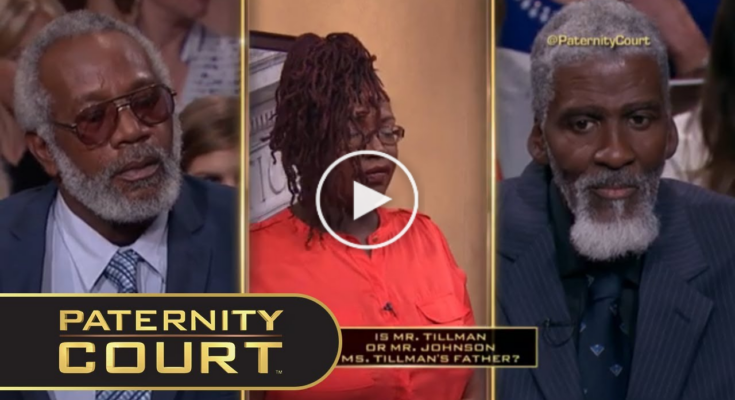In a heart-wrenching paternity dispute, the case of Tillman vs. Johnson presents a compelling narrative of identity, lost connections, and the quest for truth. The emotional testimonies of those involved reveal the profound impact of unresolved paternity issues on family dynamics. Through DNA testing and heartfelt revelations, this article explores the importance of understanding and embracing the complexities of family relationships.
“You may be seated. Hello, Your Honor. Hello. This is the case of Tillman vs. Johnson.” – Judge Lake
Amidst paternity doubts, Gregory Tillman and Johnny Johnson claim the possibility of being Annetta Tillman’s biological father. Gregory describes his relationship with Annetta’s mother as non-committed, while Johnny admits to a romantic involvement. The uncertainty prompts Gregory to seek a DNA test to confirm his paternity.
“I didn’t believe it till I went up to the hospital and actually saw her lying up there in the hospital bed, and from that point on, I was in her life. Till they… Till they sent my daughter away.” – Gregory Tillman
Annetta’s birth certificate lists Cester Ruth Williams as her mother but curiously omits the name of her father. Gregory claims he signed the certificate at the hospital, but the missing father’s name raises doubts. Annetta expresses confusion about her last name being Tillman when her father’s name is absent.
Following Annetta’s birth, she was sent to live with relatives in Georgia, leading to the estrangement between Gregory and his daughter. Johnny Johnson also lost contact with Annetta and expresses frustration at not being able to find her. Annetta grew up believing Johnny to be her godfather and father figure
“I always wanted to be a part of her life. I don’t intend to lose her again.” – Gregory Tillman
The case underscores the emotional complexities of paternity disputes and the significance of DNA testing in resolving them. The absence of a father’s name on Annetta’s birth certificate affected her upbringing and sense of identity. The lost connections between Gregory and Annetta and Johnny’s efforts to find her demonstrate the far-reaching consequences of unresolved paternity issues on family bonds.
“You can’t tell me you knew I was out there and you couldn’t find me. You did not find me, so you did not search hard enough!” – Annetta Tillman
Despite the court ruling, Johnny’s love for Annetta is evident, urging her to embrace the love of both potential fathers. The article emphasizes the importance of communication and acceptance within families, regardless of the DNA test results.
“Even though it’s hard for you to understand for some people, as he said, he’s old school. It’s so foreign to them they don’t even know where to begin. I do believe he wants a relationship with you. You have Mr. Johnson; he’s not going anywhere.” – Judge Lake
The case highlights the emotional turmoil experienced by all parties involved. Gregory’s desperation to reconnect with his daughter and Johnny’s hope to be recognized as her father demonstrate the profound desire for familial bonds. Annetta’s feelings of confusion and loss are equally palpable, reflecting the impact of paternity disputes on children.
“I always wanted to know where he’s been? I want to know why he wasn’t there? He missed out on so much.” – Annetta Tillman
The Tillman vs. Johnson case serves as a poignant reminder of the importance of understanding and embracing the complexities of family relationships. While the advancements in technology have made it easier to locate individuals, not everyone is well-versed in modern methods. Thus, empathy and patience are essential in resolving such disputes.
“I see it too. Mr. Johnson, I don’t feel like talking to you. Mr. Tillman, hold on. You ain’t got to talk. All you got to do is listen.” – Judge Lake
As the court pronounces Gregory Tillman as Annetta’s biological father, the family has the opportunity to rebuild their bonds. DNA testing, though pivotal, is just the first step towards reconciliation. Efforts to bridge the emotional divide and establish open communication channels are essential to healing familial wounds.
The Tillman vs. Johnson case reveals the emotional toll of paternity disputes and the significance of DNA testing in determining biological relationships. The absence of a father’s name on Annetta’s birth certificate reflects the uncertainty and complexity of her upbringing. Lost connections between Gregory and Annetta, as well as Johnny’s efforts to find her, highlight the profound impact of unresolved paternity issues on family dynamics.
Despite the court’s ruling, Johnny’s love for Annetta and the desire to rebuild family bonds emphasize the importance of communication and acceptance within families. The case serves as a poignant reminder of the need for empathy and understanding, especially in navigating modern family dynamics.
In the end, the case of Tillman vs. Johnson demonstrates the resilience of the human spirit in seeking truth and fostering familial connections. As Annetta embarks on a journey to rediscover her identity and embrace her family, it is a testament to the power of love and determination in rebuilding broken bonds. Through communication, empathy, and mutual respect, families can heal and find strength in their shared history.



